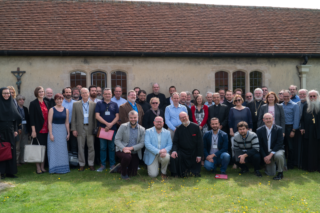While in fact only nine and a half months will have passed from the submission of my research proposal to the actual beginning of my doctoral studies, it feels much longer. Some things have changed: Professor Tanner has accepted a position at Yale Divinity School and I've continued to explore questions in sacramentology concerning baptism and the practices of the Metropolitan Community Churches. But excerpted below is a passage from my original candidate statement, detailing what I proposed in my application:
Through interactions with Drs. Kathryn Tanner and Robert Bird I have reached the conclusion that few places are better equipped or more receptive to exploring new directions in queer theology informed by Eastern Orthodox thought than the University of Chicago.
Dr. Tanner's own work in constructive theology is deeply informed by theologians of both the Patristic and later Eastern Orthodox traditions, while her work with Foucault's theories of gender and sexual identities bears directly on many LGBTQ constructive theological tasks.
Dr. Bird's research interests and teaching include both Russian Silver Age theologians such as Pavel Florensky and Sergius Bulgakov, and Neo-patristic theologians such as Vladimir Lossky as well as a course offering in the aesthetics of Eastern Christianity.
In addition to these two professors, other Divinity School faculty whose expertise might be helpful include Dr. Margaret Mitchell, who has co-taught with Dr. Tanner on Gregory of Nyssa, and Dr. Willemien Otten, whose courses cover both early Church Fathers and figures such as Dionysius the Areopagite whose apophatic theology is key to the Neo-patristic movement.
Finally, the Lesbian & Gay Studies Project of the Center for Gender Studies could also play an important role in this project, drawing together scholars in multiple disciplines throughout the University of Chicago for the study of LGBTQ identities and politics and queer theory.
Drawing on the resources at hand, I suggest that further work in queer ecclesiology and same-gender relationships might benefit from the model of same-sex friendship offered by Pavel Florensky as an alternative to marriage which he viewed as a pagan holdover sanctioned by the Church.
Further, the collective nature of humanity in matters of anthropology, salvation, ecclesiology, theosis and eschatology within the various traditions of Eastern Orthodox thought provide fruitful models for reflection in developing new theologies that are relational without succumbing to the placement of humanity at the central focus of being.
But one might also ask how Eastern Orthodoxy might benefit from LGBTQ perspectives. As an outsider to the Orthodox tradition I have no pretensions to altering the course of Eastern Christian thought. Orthodox Christianity has been historically quite slow to embrace new information brought about by gender and sexuality studies. However, a mutually enriching dialogue might also offer up theological formulae that both recognize earlier dogmatic developments while expanding understandings in areas unimagined by earlier Ecumenical Councils. For example:
- How might the dogma of a humanity that bears the image and likeness of God based on the life in Christ which knows no male and female benefit from queer theory which reaches similar conclusions through theories of social construction?
- And taken to their logical conclusions, how might such insights challenge gender-specific roles within Eastern Orthodox ecclesiastical ministry?
- Building on Dr. Tanner's work in recognizing relationships in queer and Christian contexts that go beyond consanguinity, how might Orthodox churches benefit from understandings of kinship that move beyond ethnic identity and shared cultural values which are also negated within the life of Christ?
In the months to come, these original questions will probably be reshaped or completely discarded as new lines of inquiry open. I lay them out here as a record of the developing thoughts that have led me to graduate school...





Great subject matter!!!Thanks